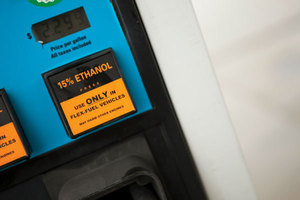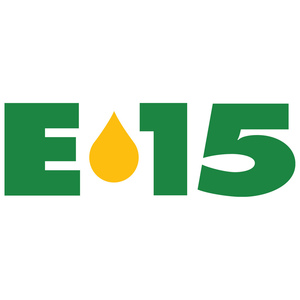Senate bill introduced to give E15 year-round market presence



March 2, 2017
BY EPM Staff
A bipartisan trio of Senators introduced a bill today that would extend the Reid vapor pressure (RVP) waiver to ethanol blends above 10 percent, a move that would give E15 year-round market presence.
Sens. Deb Fischer (R-Neb.), Joe Donnelly (D-Ind.) and Chuck Grassley (R-Iowa) introduced the Consumer and Fuel Retailer Choice Act (S. 517, H.R. 1311) to increase market access opportunities for higher blends of ethanol. It would allow retailers across the country to sell E15 and other ethanol blends year-round, increasing regulatory certainty and eliminating confusion at the pump.
“As one of America’s largest producers of ethanol, Nebraska can provide renewable solutions for our nation’s energy needs,” Fischer said. “The bipartisan legislation we are introducing today would expand fuel options for consumers and remove regulatory burdens that limit the use of E15. It would also ensure a fair playing field for higher ethanol blends, expanding fuel choices and strengthening our energy diversity.”
Donnelly added, “Biofuels give consumers more options and reduce fuel prices at the gas pump. This legislation would expand the market for ethanol producers, opening more market opportunities for fuels grown on Hoosier farms. I am proud to join my colleague Sen. Fischer, along with Sen. Grassley, in a bipartisan effort to eliminate the senseless restriction on ethanol producers and consumers.”
Advertisement
Grassley said since the EPA has never acted on its authority to grant a Reid vapor pressure waiver for E15, legislative action is warranted. “Consumers appreciate having choices, whether it’s at the grocery store or the fuel pump,” he said. “Those of us who live in biofuels-producing states understand the appeal of cleaner, domestic, renewable fuels. The EPA should be consistent in the way it treats different fuel blends as a matter of fairness and to give consumers more options for fueling their vehicles”
Each year, the EPA regulates RVP for gasoline and ethanol-blended gasoline from June 1 until September 15. During these months, when many travelers are on the road, the EPA restricts the retail sale of fuels with ethanol above 10 percent. Only higher blends that go through extra and more costly refining may be sold to consumers during this time. Furthermore, retailers are forced to change fuels or labeling during the summer fueling season. This is why retailers often choose not to sell higher ethanol blends, such as E15, since they can only sell these products mid-September until May. The Consumer and Fuel Retailer Choice Act would allow retailers to sell E15 all year long without going through the costly approval process.
Ethanol industry lauds bill
“The introduction of the Consumer and Fuel Retailer Choice Act is the first step toward eradicating an unnecessary EPA restriction that limits consumer choice at the pump during the peak time of the year when Americans are on the road,” said Growth Energy CEO Emily Skor. “E15 is a federally approved fuel that saves motorists money, boosts engine performance, and improves the environment. Biofuels like E15 are the most effective alternative to fossil fuels and a critical tool for reducing greenhouse gas emissions and improving air quality. It is simply ridiculous that law passed in 1990 to spur ethanol fuel sales would prevent today’s drivers from having this choice of a high-performance, environmentally friendly 21st century fuel year-round. We commend the sponsors of this bill for their efforts to provide consumer choice at the pump and look forward to working with them to get this important legislation enacted.”
Advertisement
Renewable Fuels Association President and CEO Bob Dinneen, said, "I applaud the leadership of Sens. Fischer, Donnelly and Grassley, and Representatives Loebsack and Smith, for calling attention to this critical issue that hinders stations from offering year-round access to E15 and other higher level ethanol blends. Major marketers like Thornton’s, Kum & Go, Sheetz and RaceTrac already offer the fuel blend, but the industry is being hamstrung by EPA’s nonsensical disparate treatment of higher level blends. Ethanol is the lowest cost, cleanest and highest octane source of fuel on the planet. Greater consumer access to higher level blends remains our top priority and we are committed to working with leaders in Congress and the administration to make that a reality."
RVP is a measure of how quickly fuel evaporates. The EPA regulates RVP to prevent increased ozone or smog from vehicle emissions. Congress granted E10 an RVP waiver because E10 reduces tailpipe emissions. EPA does not give E15 the same RVP waiver as E10, even though it is less volatile. Consequently, retailers are largely prohibited from selling E15 for use in 2001 and newer vehicles from June 1 through September 15, despite its approved use by the EPA. The EPA fails to account for the fact that higher ethanol blends are less volatile, and fuel such as E15 further decrease emissions, replacing toxic additives in gasoline that have been proven to cause cancer, asthma, groundwater contamination and smog.
Currently E15 is being offered at approximately 650 locations in 28 states. Leading retailers offering E15 include: Sheetz, Thorntons, Murphy USA, RaceTrac, Minnoco, Protec and Kum & Go.
Related Stories
The U.S. Energy Information Administration maintained its forecast for 2025 and 2026 biodiesel, renewable diesel and sustainable aviation fuel (SAF) production in its latest Short-Term Energy Outlook, released July 8.
XCF Global Inc. on July 10 shared its strategic plan to invest close to $1 billion in developing a network of SAF production facilities, expanding its U.S. footprint, and advancing its international growth strategy.
U.S. fuel ethanol capacity fell slightly in April, while biodiesel and renewable diesel capacity held steady, according to data released by the U.S. EIA on June 30. Feedstock consumption was down when compared to the previous month.
XCF Global Inc. on July 8 provided a production update on its flagship New Rise Reno facility, underscoring that the plant has successfully produced SAF, renewable diesel, and renewable naphtha during its initial ramp-up.
The U.S. EPA on July 8 hosted virtual public hearing to gather input on the agency’s recently released proposed rule to set 2026 and 2027 RFS RVOs. Members of the biofuel industry were among those to offer testimony during the event.
Upcoming Events










